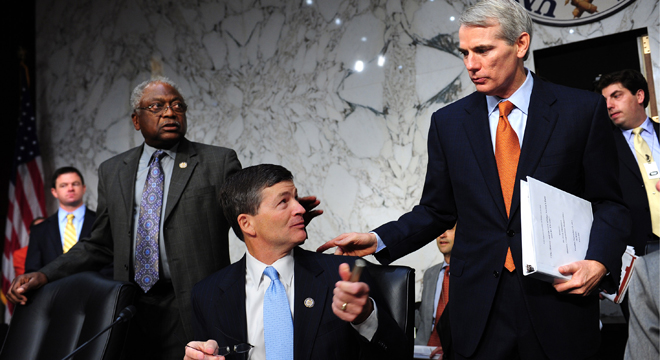With less than a month before their November 23 deadline, Democrats on the deficit Super Committee are facing serious pushback from their Republican counterparts for proposing a broad deal that would reduce deficits by nearly $3 trillion — including cuts to popular programs like Medicare — because it also includes more than $1 trillion in new tax revenues, according to aides briefed on private negotiations.
Sources remain mum on the specifics of the cuts and taxes Dems have put forward. And they caution that most, but not all, of the Democrats on the panel support the push — an effort to achieve multiple Republican votes for a plan modeled on the “grand bargain” President Obama tried to strike with John Boehner.
But they got some unexpected help from Congressional Budget Office director Doug Elmendorf who testified before the panel Wednesday. He cited analysis his office did about a year ago, which found that allowing the Bush tax cuts to expire would carry greater reward than risk — that the hole they punch in the budget overwhelms the positive impact they have on productivity.
“Extending [the tax cuts] had a negative effect on reducing deficits, and a positive effect of keeping marginal tax rates lower and thus encouraging work and saving,” he told the panel. “In our estimates, the negative effects of the extra debt were larger than the positive effects of lowering marginal tax rates. But those particular policies that we looked at — again over the medium and longer term — that’s why the answer really depends on the specifics of the policy.”
This analysis will bolster Democrats’ push for parity between cuts to entitlements and new revenues as part of any deficit deal, but it won’t sway Republicans, who have drawn a hard line on raising revenue through the tax code, or by any substantial means other than economic growth.
To that effect, Democrats on the panel are also said to be pushing for hundreds of billions of immediate spending on jobs programs as well. Sen. Max Baucus (D-MT) — a Super Committee member and chairman of the Finance Committee — outlined a broad plan for higher taxes, entitlement cuts, and economic stimulus at a private meeting Tuesday, but Republicans balked.
On Wednesday, Elmendorf buttressed his case.
In an exchange with Rep. Chris Van Hollen (D-MD) — House Dems’ top budget guy — Elmendorf confirmed that new infrastructure spending, extending unemployment benefits, and an renewal and broadending of the payroll tax holiday will create economic growth.
Watch that exchange here:
President Obama has proposed that Super Committee members find 10-year savings beyond their required $1.2 trillion, and use those savings to fund immediate measures to promote economic growth. His jobs bill enshrined this principle, but Republicans have thus far been broadly resistant to any short-term growth measures, and even more so to the notion of paying for them with higher taxes on wealthy Americans.










